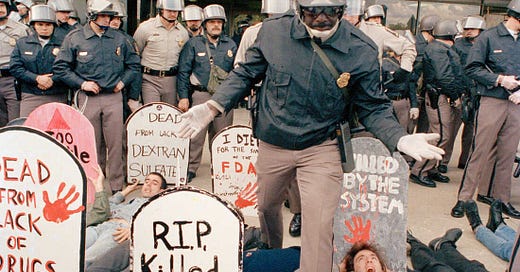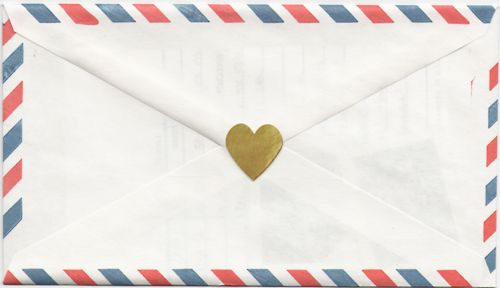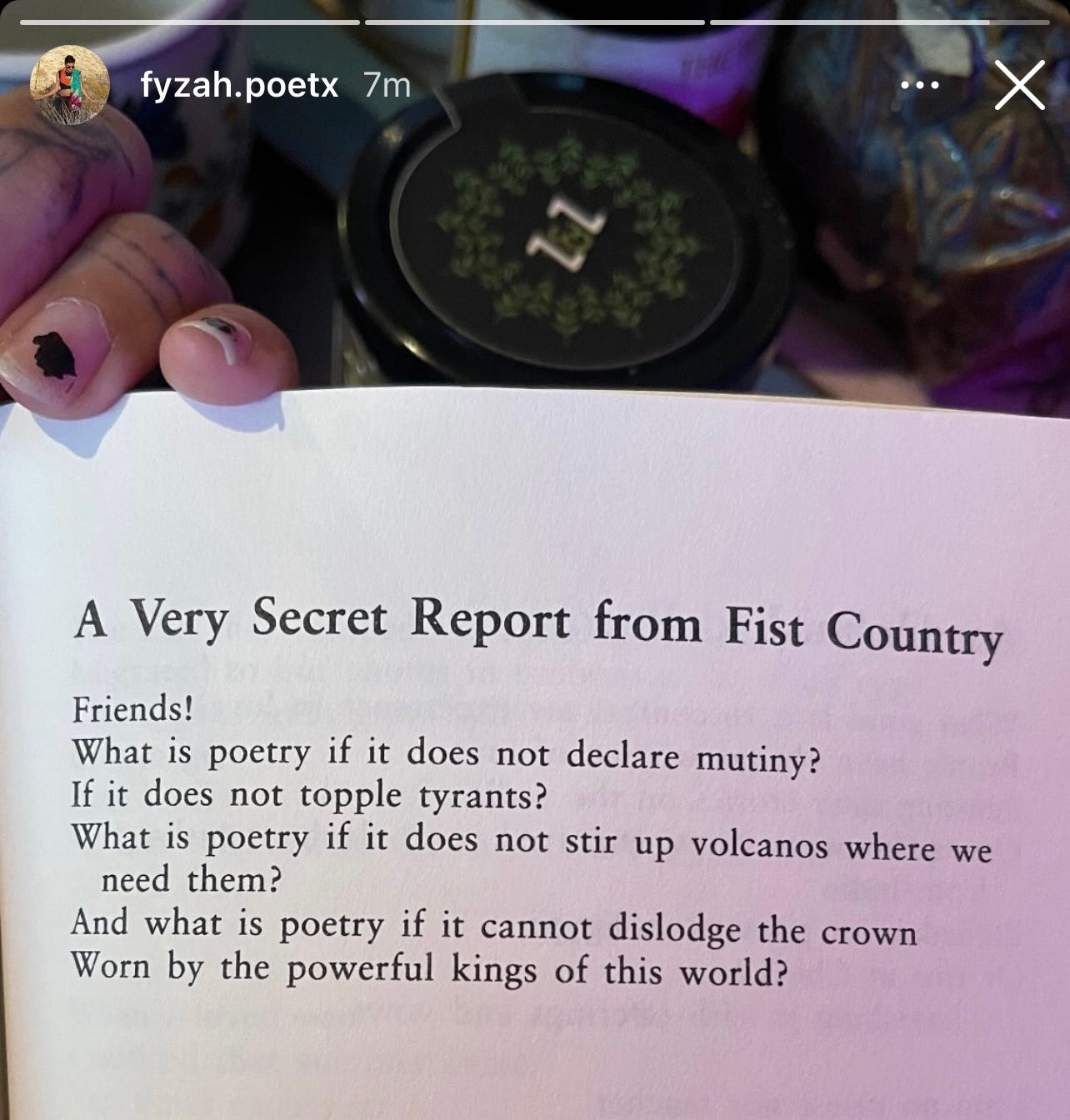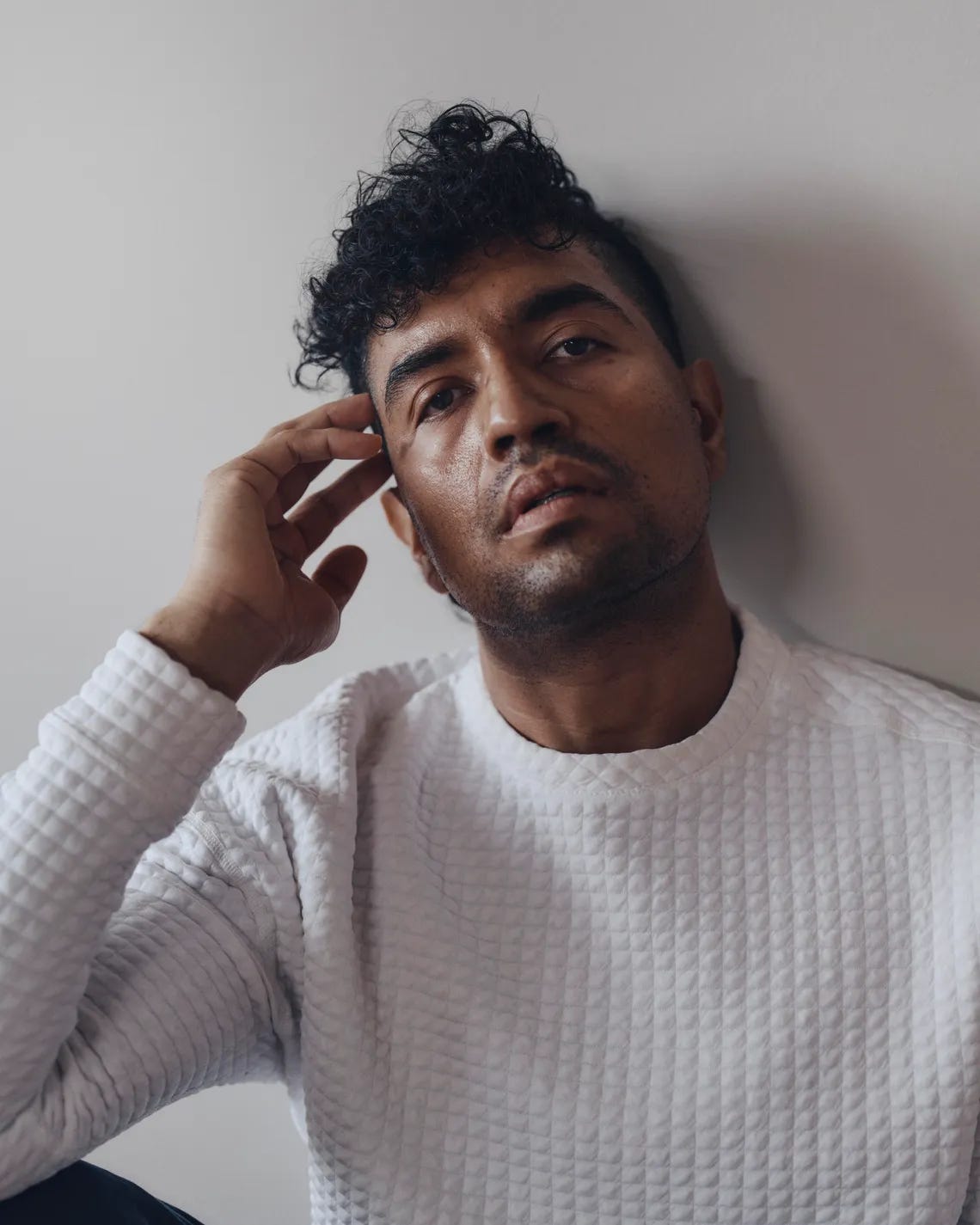archive soup: queer sacrifice for Palestine, "terrorism is beautiful", and resistance is terrific!
february week 5, 2024
Hi dear friends! My apologies for missing a week. I won’t lie, it was a really hard week…but in a way, it was needed. Sometimes you need to feel all the icky pain to move forward into joy. I hope you all are doing ok! My weekly roundups consist of careful and intensive research. If you would like to support me, I would deeply appreciate it if you would share, comment, and become a paid subscriber. Thanks!
Reading
My dear friend, Fyzah, shared this poem and I was intrigued to know who wrote this:
I went down a rabbit hole and learned about the beautiful poetry of Syrian poet, Nizar Qabbani. His words reminded me of Palestinian poet Mahmoud Darwish, how his poetry is filled with beauty and love even when talking about pain and oppression.
My favorite poem of Qabbani is I Am With Terrorism. My favorite part is:
“We are accused of terrorism
if we defended land
and the honor of dust
if we revolted against the rape of people
and our rape
if we defended the last palm trees in our desert
the last stars in our sky
the last syllabi of our names
the last milk in our mothers' bosoms
if this was our sin
how beautiful is terrorism.
I am with terrorism
if it is able to save me
from the immigrants from Russia
Romania, Hungaria, and Poland
They settled in Palestine
set foot on our shoulders
to steal the minarets of al-Quds
and the door of Aqsa
to steal the arabesques
and the domes.
We are accused of terrorism:
if we defended with full-force
our poetic heritage
our national wall
our rosy civilization
the culture of flutes in our mountains
and the mirrors displaying blackened eyes.
I am with terrorism
if it is able to free a people
from tyrants and tyranny
if it is able to save man from the cruelty of man
to return lemon, olive tree, and bird to the South of Lebanon
and the smile back to GolanFor all this
I raise my voice high:
I am with terrorism
I am with terrorism
I am with terrorism...”
Wow. Nizar’s words will echo through me forever.
Engaging
Just two days ago, Aaron Bushnell breathed his last words, “I will no longer be complicit in genocide. Free Palestine” and set himself on fire outside the Israeli embassy in D.C. I have not watched the video but listened to an audio recording. I closed my eyes and listened to him screaming Free Palestine Free Palestine Free Palestine over and over again, burning to death, as police forces drew guns at him.
I am reminded of Thích Nhất Hạnh's words on self-immolation:
“To burn oneself by fire is to prove that what one is saying is of the utmost importance..it has expressed the unconditional willingness to suffer for the awakening of others.”
I honestly don’t have the words for this grief or rage that I feel.
إِنَّا لِلَّهِ وَإِنَّآ إِلَيْهِ رَٰجِعُونَ | Indeed we belong to Allāh, and indeed to Him we will return.
While learning about Aaron Bushnell, I came across an article Hanna shared on Instagram.
Victor I. Cazares is an Indigenous queer Mexican playwright. On December 1st, Cazares filmed an Instagram video of burning their first dosage of HIV medication inside a miniature pyre their grandparents had brought from El Apache. They gave their second pill a burial with a flower on top in their parent’s backyard. The third received a drop of Cazares’s blood while Lucía Méndez’s “Amor de Nadie,” the theme song of their favorite telenovela growing up, played in the background.
According to Jung’s article on Vulture, it has been 3 months since they last took their HIV medication, and will continue their strike until The New York Theatre Workshop, who has remained silent even after Victor’s ongoing protest, calls for a cease-fire in Gaza.
Cazares talks about how the theater world’s silence about Gaza has been weighing on them. They then thought about queer revolutionaries that had organized “die-ins” to get HIV medication to begin with.
In the 1980s when the AIDS epidemic erupted, killing thousands of queer and trans folks, the deadly epidemic was ignored by the American government and public health agencies due to deep-seated homophobia. The government’s decision to dismiss the epidemic and make medication inaccessible was a strategic way to ultimately queer and trans people. Their ignorance and silence were a way of killing us.
The LGBTQ+ community was left abandoned and had to create its own support. Organizers behind ACT UP (AIDS Coalition to Unleash Progress) were intentional in not raising funds or providing care, but using direct action and civil disobedience to highlight the failures of society and the political system to care for people with HIV/AIDS. While white gay men are viewed as the main (and only) narrative of the AIDS protests, the younger white men had no experience and learned from fellow lesbians/queer women and Latinx folks who came in with a lot more experience from previous movements. Black and brown queer and trans folks were the leading forces of the movement.

It is important to note that AIDS activists weren’t the first to utilize the imagery of death to call attention, but the action became a powerful tool to emphasize how the epidemic was being stigmatized and ignored, leading to bodies piling up. In ACT UP’s case, “they forced social and cultural institutions to take responsibility for the AIDS deaths by having to physically move the protesters’ bodies,” says Matt Brim, professor of queer studies at City University of New York.
For Cazares, it felt right to use the roots of queer activism as a protest. They said,
“I am using the particular history of HIV and the New York Theatre Workshop,” they say, referencing Rent, a pivotal production in the Workshop’s history. “HIV has always been a part of my presence. So it became inevitable it would then become a protest.”
When Jung asked them how far they were willing to go, they responded saying,
“The way I view my strike is physicalizing their inaction.” If the suffering of Palestine is a faraway, abstract concept, they hope their body becomes a bridge across that gulf: “Maybe they don’t feel much for Palestinians. They can’t imagine. But they’ve spoken to me. They can visualize my life. They’ve seen me be among them. What I’m hoping is that my life means something.”
Victor reminds us all how queer liberation is connected to Palestinian liberation. Our struggle is collective.
As each day goes by, I am thinking of Aaron and Victor. I am struggling to find the words to as I am still comprehending this act of true bravery and dedication to liberation. Free Palestine. That is all I can manage to say right now.
Loving
As my mind has been struggling to grapple with the state of the world, I have been reminding myself of my favorite essay from June Jordan’s book, Civil Wars:
IT IS COLLECTIVE! RESISTANCE FEELS TERRIFIC! YES!
This week’s roundup is on the shorter side as it’s been hard to focus on anything else besides what is going on in Palestine. I encourage you to keep reading, to keep thinking, to keep fighting for Palestine. Let your exhaustion and grief fuel you.
What have you been reading, engaging, listening/watching, and loving lately? Do tell and comment below <3









really appreciate this piece, fabliha❤️🔥
thank you for sharing, and for honoring both aaron bushner and victor.🕯️
i’ve been thinking about the imagery of death to draw attention lately. at a recent protest in seattle, we carried homemade burial shrouds through the streets and laid them out side by side. at another protest in olympia, we laid down on the steps of the capitol, holding the names of martyrs on our chests. these rituals are a powerful source of remembrance, a conscious embodiment that draws us into grief and toward our humanity.🕊️🕯️
Loved reading this piece💌